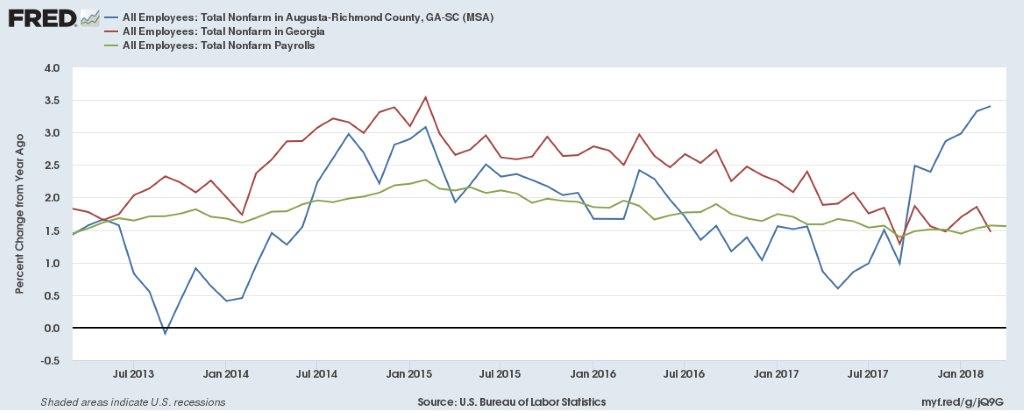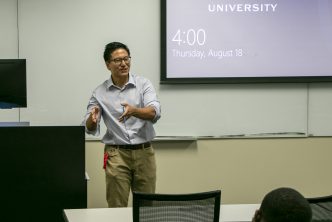On Friday May 4, the Bureau of Labor Statistics reported that the unemployment rate in the U.S. was 3.9%, the lowest since 2000. April represented the 91st consecutive month of job gains, the longest streak of increases on record.
Augusta has also been doing well with record levels of employment seen in March (242,900). In Georgia, other cities are doing well, with the first quarter witnessing record levels of employment in Athens, Atlanta, Gainesville, Hinesville, Savannah, and Warner Robins. Month to month changes can be more variable at the local level compared to the national data, but Augusta has not seen year to year decreases in employment since September 2013. The jobs growth rate in the first quarter was 3.2% – double the national average!
There are still some puzzles in the labor market, both locally and nationally. The unemployment rate in Augusta has remained pretty level at 4.7% since July 2017 despite over 7,000 new jobs being created. Wage growth continues to be lackluster at just 0.1% nationally and weekly earnings in Augusta have decreased each month in the first quarter. Locally, the answer to both puzzles may be the increase in the number of people who are looking for work. The labor force (the number of people employed and unemployed) has increased by ten thousand over the last year but only seven thousand have found jobs. This has allowed employers to find attractive workers without having to pay higher wages.
As we experience strong economic growth we should strive to ensure all can participate in future prosperity. There has been much talk in the media about the gender pay gap, particularly in movies. In Augusta, women’s median earnings are 75% of men’s. The national gender pay gap is 80 percent and has narrowed from 60% in the late 60’s as women have increased their involvement in the labor market. They have benefited from more and different kinds of education, medical advances, technological progress in the home, the availability of child care and changes in social norms. A recent journal article by Rachel Ngai and Barbara Petrongolo suggested that the rise of service industries has helped because women have better communication and interpersonal skills and social attitudes such as altruism, fairness, and caring behavior that that are highly valued in the service sector.
However, some sectors of the economy still see very large gender pay gaps. In Augusta a woman can expect median earnings in management occupations of just 62% of men’s median earnings. Worldwide, women make up 58 percent of bank employees but just 38 percent of middle managers and 16 percent of executives. Women still struggle to gain promotions relative to men.
Health diagnosing and treating practitioners who are women earn 42 percent of men’s earnings in Augusta, but a woman health technologist earns 111 percent. Maybe some of this difference is worker preferences with women choosing positions that offer more flexible or fewer hours. But some of the difference may be because of old fashioned ideas about “female” and “male” jobs.
The UK has just required companies to publish their gender pay gaps to spur thinking about recruitment and retention policies. After all, firms in the bottom quartile for gender diversity in leadership are 29 percent less likely to achieve above-average profitability. Maybe Augusta should require publishing gender pay gaps?







